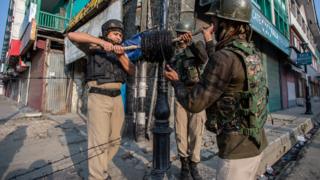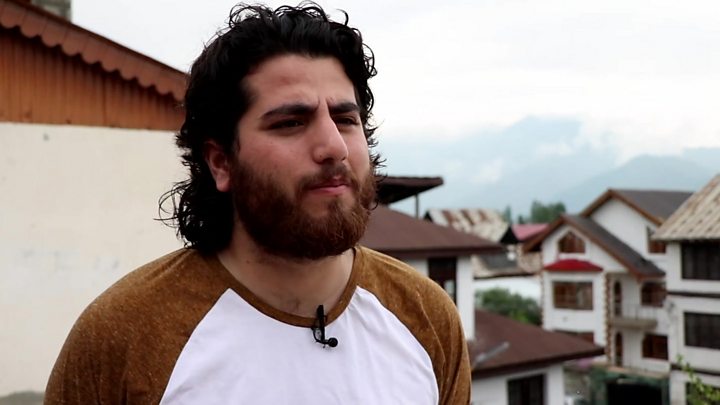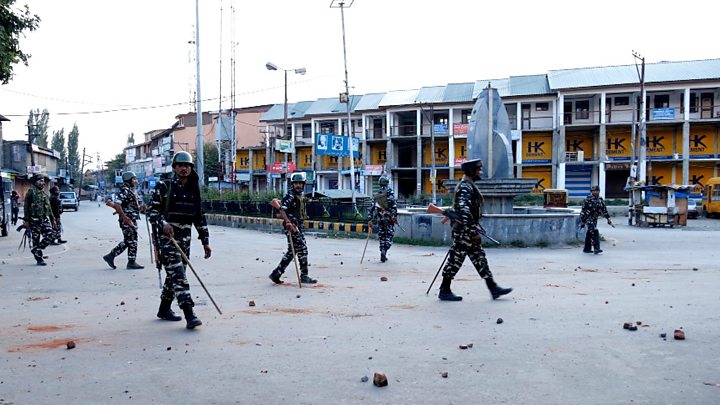‘Even I will pick up a gun’: Inside Kashmir’s lockdown
Indian-administered Kashmir has been under an unprecedented lockdown since Monday, when India revoked a special constitutional status dating back nearly 70 years. The BBC’s Geeta Pandey travelled for two days around the region, where a bitter sense of betrayal threatens to fuel fresh conflict.
In the heart of Srinagar city, Khanyar is an area notorious for anti-India protests. To get here during what amounts to a virtual 24-hour curfew, we pass through half a dozen roadblocks.
As we come across yet another barricade, I get out of my car to take some photos. A few men emerge from a laneway to complain about living under what to many feels like a siege. “This is extreme thuggery on the government’s part,” says an elderly member of the group.
The paramilitary police try to hustle us away but the man wants to be heard. “You lock us up during the day. You lock us up at night,” he shouts angrily, wagging his finger. The policeman says there’s a curfew in place and that they must go inside immediately. But the diminutive old man stands his ground and challenges him again.
At that point, I’m ordered to leave. But before I can, a young man, carrying his toddler son in his arms, tells me he is ready to pick up a gun to fight India.
“This is my only son. He’s too small now, but I will prepare him to pick up a gun too,” he says. He’s so angry that he doesn’t even care that he’s saying all this within earshot of the policeman standing near us.
Across the Muslim-majority Kashmir valley, I meet men who tell me they no longer want to live life in fear of the security forces. An insurgency has been taking place here for 30 years, but what residents call a “dictatorial order” from far-away Delhi has pushed people who never supported separatism into a corner.
They say it will have serious consequences for both Kashmir and India.
This is very much the dominant sentiment everywhere I go – anger mixed with fear and worry, and a fierce determination to resist the central government’s move.
Srinagar – the summer capital of Jammu and Kashmir – has been under a virtual lockdown since Monday morning and the city resembles a ghost town. Shops, schools, colleges and offices are all shut and there is no public transport on the roads.
Thousands of gun-wielding troops patrol deserted streets that are barricaded with coils of razor wire, and residents remain locked up inside their homes.
For nearly a week now, two of the former state chief ministers have been in detention while a third, who is currently an MP from the state, is under house arrest. Hundreds of others, including activists, business leaders and professors, have also been detained and are being held in makeshift prisons.
Rizwan Malik says Kashmir “now feels like a jail, a big open-air jail”.
He flew from Delhi to Srinagar less than 48 hours after Home Minister Amit Shah laid out his plans for Kashmir in the parliament on Monday.
He said he had last spoken to his parents on Sunday night, a few hours before the government shut down all communications, including the internet. There was a total information blackout, and because he couldn’t reach any of his friends or relatives either, he decided to return home.
“It’s the first time in my life that we had no way of communicating with anyone. Never before have I seen anything like this,” he told me at his parents’ home in Srinagar.
Mr Malik is furious that India has revoked Kashmir’s special status – which gave it a significant degree of autonomy and underpinned the region’s relationship with the rest of India for decades – without consulting the state’s people.
He’s not someone who believes in separatism, or has ever gone out and thrown stones at soldiers in protest; he’s a 25-year-old aspirational young man studying to be an accountant in Delhi. He says he has long believed in the idea of India because he is sold on the story of its economic success.
“If India wants us to believe that it’s a democracy, they are fooling themselves. Kashmir has long had an uneasy relationship with India [but] our special status was the bridge that joined the two. By scrapping it, they have taken away our identity. This is unacceptable to any Kashmiri,” he says.
When the siege is lifted and protesters are able to take to the streets, Mr Malik predicts that every Kashmiri will join them: “It was said that in every family one brother is with the separatists and the other is with the [Indian] mainstream. Now the Indian government has united the two.”
His sister Rukhsar Rashid, a 20-year-old architecture student at Kashmir University, says when she heard the home minister’s speech on TV, her hands began to shake and her mother, sitting next to her, began to cry.
“She was saying death would be better than this,” says Ms Rashid. “I keep waking up with panic attacks. My grandparents who live in the city’s Batmaloo area say it has turned into Afghanistan.”
India had been building up to its big move on the part of Kashmir it controls for some time. The government first announced late last month it was sending more than 35,000 additional troops to the region, an area that’s already the most militarised in the world because it is disputed between nuclear-armed India and Pakistan.
Last week, the annual Hindu pilgrimage to the Amarnath cave shrine was called off abruptly as the authorities warned of a terror threat. Then, hotels and houseboats along the picturesque Dal Lake were ordered shut and tourists asked to leave.
Everyone in Kashmir by then knew something was afoot, but of the dozens of people I spoke to, no-one expected Delhi would go this far and unilaterally revoke part of the constitution.
The communications blackout means reliable information is hard to come by, and news of what’s going on spreads by word of mouth. Despite the lockdown, we hear daily reports of protesters pelting security forces with stones in Srinagar and elsewhere. We hear a protester drowned when he was chased by troops and jumped in a river. Several people are believed to be injured and in hospital.
But the Indian government has been trying to show that all’s well in Kashmir.
On Wednesday, TV channels showed National Security Advisor Ajit Doval lunching with a group of men on the streets of Shopian, a town that’s described in the Indian press as “a hotbed of militancy”. It was an attempt to tell the world that there’s popular support for the government’s move even in the most difficult of areas and that peace and calm prevails.
But Kashmiris have dismissed it as a stunt. “If people are happy, then why do they need the curfew? Why is there a communication shutdown?” asks Rizwan Malik.
The same question is repeated in every part of Srinagar – in homes, on the streets, in the sensitive old city areas that the locals call “downtown”, and in the southern district of Pulwama, home to the militant who carried out the audacious suicide bombing targeting the security forces in February that brought India and Pakistan close to war.
As I drive through the region, men hanging out in groups by the roadside or in moving vehicles flag down my car to talk to me. They say Kashmiri voices are being suppressed, and they are desperate to be heard. They tell me how angry they are and issue dire warnings of impending bloodshed.
“Kashmir is under siege at the moment. The moment it’s lifted, trouble will start,” says Zahid Hussain Dar, a lawyer living in Pulwama. “Once the political and separatist leaders are freed from detention or house arrest, there will be calls for protests and people will come out.”
Some in the Indian press have reported that since there have been no major protests in Kashmir valley so far, it means people have accepted the government’s decision.
But the Kashmir I see is seething. I’ve been visiting the region regularly for over 20 years to report on the long-running insurgency against Indian rule, but the sort of anger and resentment that is being expressed now is unprecedented.
Most people here say they will settle for nothing less than the government rescinding its order and restoring Kashmir’s special status.
But Prime Minister Narendra Modi’s government is not known for rolling back decisions and this underpins fears in the valley that the government will come down heavily on those who resist.
On Thursday, Mr Modi defended his controversial decision, saying it was “the beginning of a new era” and promising employment opportunities and development for Kashmir.
Yet not many here are ready to back down. And it does not augur well for either Kashmiris or India.
Muskaan Lateef, a high school student, describes the current situation as “the calm before the storm”.
“It’s like the oceans are quiet, but the tsunami is about to hit the shore.”
Source: Read Full Article





